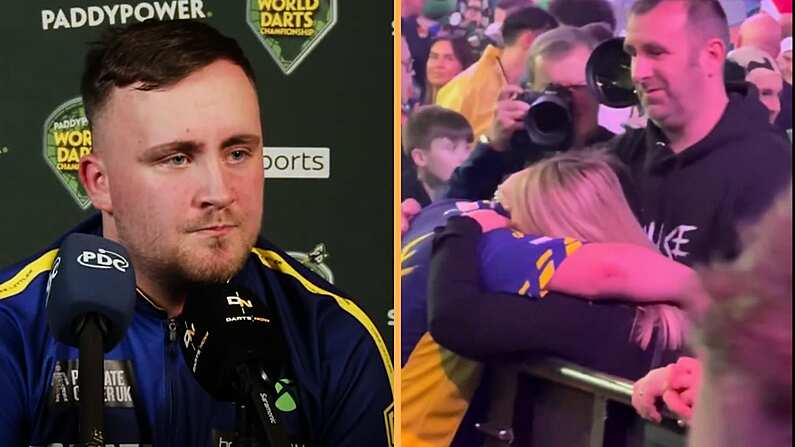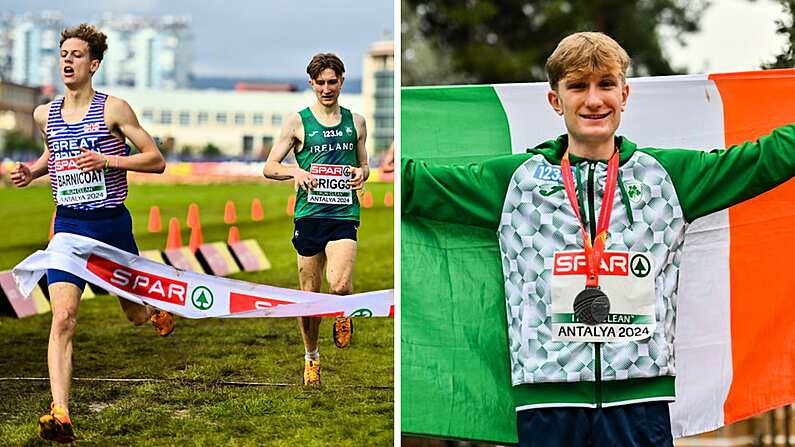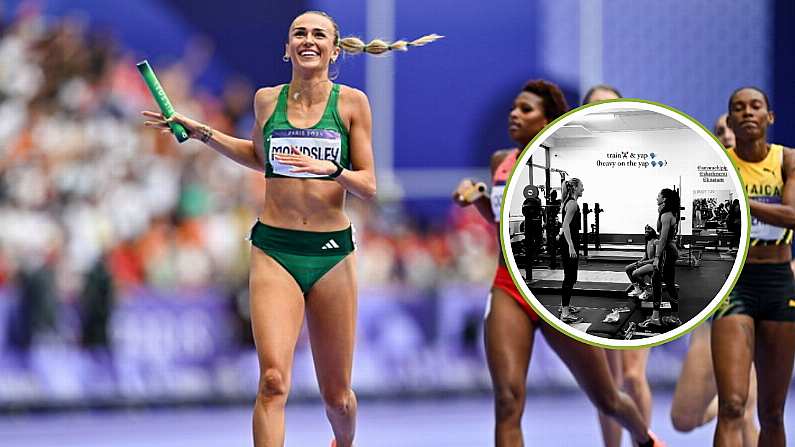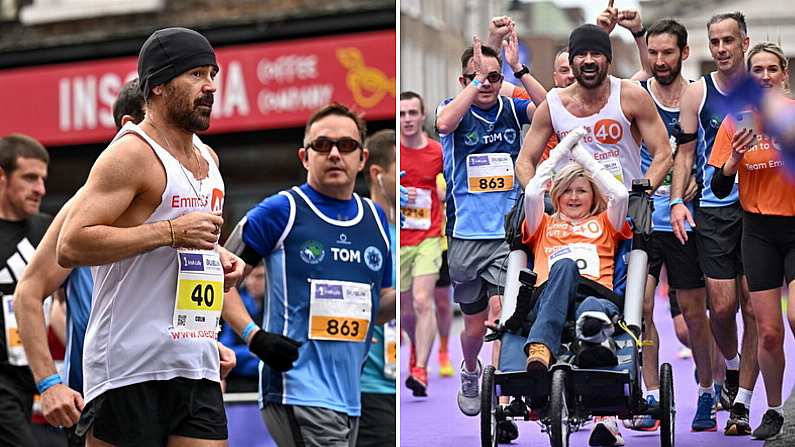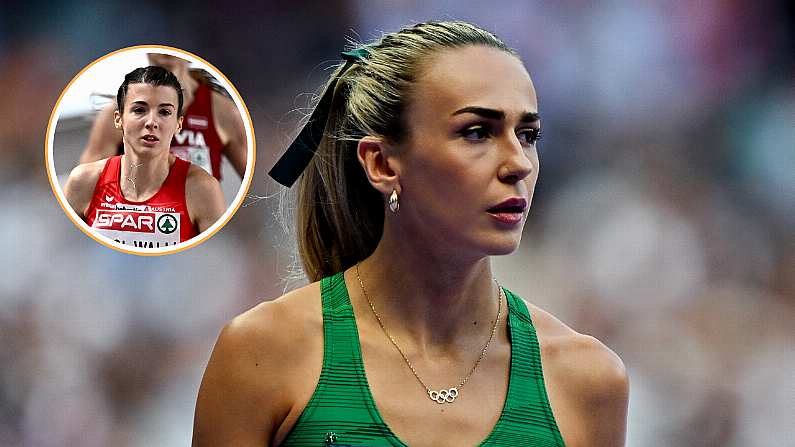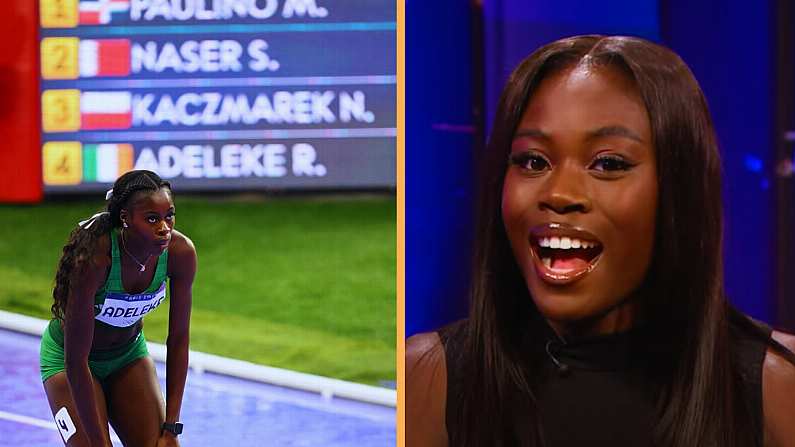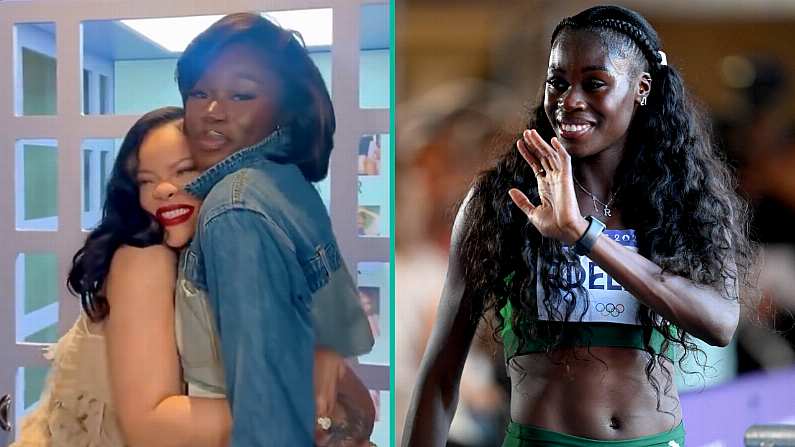Their life is like getting arrested, fighting, drugs, selling drugs. I can’t have that going on. So yeah, I stay away, just so you don't get roped in and connected.
- Leon Reid
It's 9am on a Saturday morning late last month and the rain is bucketing down in Ballymun. Leon Reid sits in the dining area of the Travelodge sipping a coffee he's just retrieved.
It's a big day for Reid - he's scheduled to run the 200m at the National Athletics Championships just over the road at Morton Stadium in Santry later in the afternoon.
He's had a busy week. It was his birthday - he turned 24; he's looking to do an Irish National Championships indoor and outdoor sprint double; there's also the significant matter of his transfer from Great Britain to Ireland.
A day earlier, IAAF president Seb Coe had announced that the freeze on international transfers had been lifted with new criteria added to prevent what had amounted to the trafficking of athletes.
In the crossfire had been caught Reid. English-born and raised, he had started his transfer two years earlier with an application for an Irish passport. His birth mother being from Belfast meant that was just a formality - though one which still took an unexpectedly long time.
The forms for his transfer were submitted days into 2017. A month later, the freeze was put in place and so ensued a lengthy wait for his switch of allegiance to be processed.
Letters pleading his case to the IAAF were written, dreams of running for at the World Championships last summer were crushed and Michael Johnson and Gabby Logan highlighted his plight before the melt eventually set in last month.
Two weeks prior to the IAAF meeting in Buenos Aires and ratifying the new rules which sanctioned athlete transfers once again, Reid - with the help of Athletics Ireland's Gill Brosnan - had submitted fresh papers at the association's request.
He was hopeful but not counting his chickens. His philosophy: they will hatch eventually. Reason for worry was elicited by the proximity of the new rules' installation to the European Championships.
That IAAF meeting took place on July 27th with the starter's gun on the Championships being on August 6th. It was an anxious wait.
What. A. Race.
Watch @LeonReid_Woody coming from behind to edge @marcus_lawler to take the 200m title at the @irishlifehealth National Championships. in Santry. pic.twitter.com/L75rgsirZU— Athletics Ireland (@irishathletics) July 28, 2018
Later on that Saturday, Reid won an epic 200m final in the colours of Wexford's Menapians AC, chasing down Marcus Lawler on the home straight after Ireland's second fastest man ever over the distance had run a superb bend to lead by a metre. RTÉ cameras trained on him the next day, Reid also won the 100m. The double-double was complete.
On the Monday morning following the National Championships, Athletics Ireland named its team for the Europeans. Reid was provisionally included in the squad - a good sign of confidence in the application.
Anxiety for Reid piqued with an Irish Times report regarding the new rules. It didn't look good. Where previously he had appeared to meet the new criteria, it was now a nebulous situation; the road ahead was hard to see.
On Friday afternoon, the cloud lifted. An IAAF review panel deemed Reid to be eligible to compete for Ireland - immediately. He would be on the plane for the Euros along with 41 other Irish athletes.
For a sprinter, it had been an unexpectedly long track but then Reid is a man accustomed to adversity.
* * *
Leon Reid thinks he might hold a record but it's not athletics related.
From the age of three he was in and out of foster homes - 14 or 15 in all. There were ones he liked but was too young to remember, the stays too short to etch permanent memories.
He counted places in Birmingham, Wolverhampton, Nottingham, Gloucester and Bristol as temporary homes.
Reid was always placed with his brother Michael, his favourite sibling. Nine years apart, they had similar personalities but Michael was more troubled than his younger brother.
"He was like always getting in trouble and kicked out of school," Reid told Balls.
"I was always trying to keep it together, because if he got kicked out of school they would have to move us and so we both would have to move."
A quiet but hyperactive child, Reid managed to stay out of trouble despite the negative influence of his brothers and sisters. He can name seven blood-related siblings in all and thinks there might be another he doesn't know personally.
A relationship with his brothers and sisters is all but non-existent. If he meets them on the street, they’ll greet each other but they inhabit different spheres.
Their life is like getting arrested, fighting, drugs, selling drugs. I can’t have that going on. So yeah, I stay away, just so you don't get roped in and connected.
It’s not that I’m embarrassed or anything, it’s just different worlds.
Athletes who make it to a high level despite a troubled upbringing often cite sport as their saviour. Not Reid.
"It’s more just common sense really. Some people let it consume them but I was more like switched on when I was younger and in foster care
"My brother, I think he was the youngest person in Bath to have an ASBO because he speared a duck in a park. Then he got arrested when he was 14 and he was in prison for like three years. He was in and out.
"So I was like, ‘It doesn't look fun. It’s an inconvenience for me to come visit you in prison, so I'm not going to do that to anyone else, to inconvenience them’.”
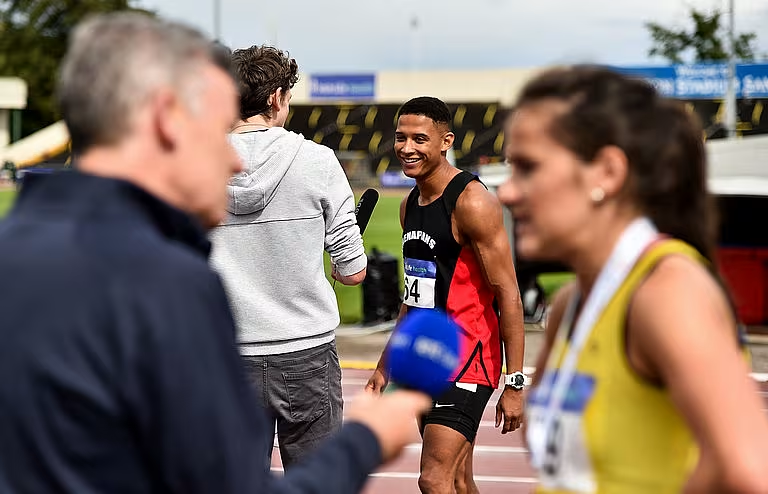
Foster care was his life due to parents with issues of their own. His mother was Anne-Marie Mulholland. Born in Belfast, she moved to Bath with her parents. A drug addict, she died in recent years. Any connection with her son was long gone.
"It’s not like she would ignore me but we’d walk past each other and she wouldn’t know who I am, just because she was out of it.”
"I think it was two years ago. I’m not 100% sure," he says about his mother's death.
"We weren’t close at all. Someone told me my mom passed away and I was like ‘Okay, but what do you want me to do about it?’ I never really spoke to her anyway."
Reid's father is still alive. They still speak but are not especially close. A life spent in and out of prison prevented a strong bond from developing.
There is a woman Reid calls his mother and him her son. Born in Enniscorthy, Claire Russell is his connection to Irish club Menapians. She’s a lecturer at Bath University and also a practising solicitor.
After getting into a fight at primary school, Reid and Russell’s son Ryan became close friends and have remained tight since. He calls Ryan his brother.
“He was always like asking why are you always moving?
“And he was like why can’t you come move in with us and I did end up moving in with them and then I moved out and then I moved back in.”
At 15, Reid signed himself up for athletics. It was immediately clear that he had talent. Without blocks, he ran 11.3 for 100m and 23 flat for 200m. The latter was achieved after jogging the first half of the race. Inexperienced, he didn’t know any better. Weighing just 45kg, he was pretty much blown down the track.
His times were posted online and he soon got a call. He went to train with James Hillier, the man who remains his coach to this day.
“I got a message from someone down in Bath saying, ‘Do you want to come and train with some of the best in the country?’
“I was still a cocky little 15-year-old, so I was like ‘Yeah, I can do that’.”
Six months later, he won two silver medals - 100m and the 4x100m relay - at the 2011 European Youth Olympics in Turkey. His career had burst out of the blocks.
Pocket money at the time was spent travelling to and from Bath to train three or four times a week; two hours there and two back to his foster home. He had tasted success and wanted more; appetite whetted, not sated.
2013 brought another Euro medal but also tragedy. At the European Juniors in Italy, he won silver in the 200m, finishing behind Nethaneel Mitchell-Blake in a Great Britain one, two, three.
Not long off the podium, he was told his brother Michael - his favourite brother - had died.
He had a heart defect - his dad passed away young. He was taking cocaine and it really didn’t help.
So I got sent home early. The day I got my medal. So it was like fun and sad in the same day.
Reid now has a tattoo on his arm - a shamrock - in memory of his brother. With the death came the realisation that he could run for Northern Ireland. “After speaking to them [family] at the funeral, it came around that I could run for Northern Ireland as my mum was born there,” he said in 2014 prior to competing for Northern Ireland at the Commonwealth Games.

Those championships, the only one from which he has not returned with a medal, were hampered by a freak injury in a competition prior to the Games.
“I broke my face. Someone ran into me in the warm up. I broke my cheekbones, nose, jaw, ribs, shoulder, I couldn’t eat for six months.
“I hit the crown of his head, which is the strongest part and then I just woke up on the floor, it was like when someone get shot in films, it was like black and white.
“I was concussed but I didn't know it at the time. I got to the ambulance and I laid down and then my mouth started bleeding, my nose started bleeding, my eyes started bleeding, my ear started bleeding and they were like you’re not going to race today. I was like, ‘I’ll be fine, just get me an ice pack’.
“I was in such good shape and that was the race that we were building to, to go and fucking smash it. And then gone. So Commies, I still got selected but was knocked out in the semis but it’s the only championship that I never got a medal.”
Reid last ran for Great Britain three years ago. That’s part of why his application to run for Ireland was successful.
He won a silver medal in the 200m at the 2015 European U23 Championships. ‘Come home with a medal,’ officials had told him, and his funding would be secured. Upon returning - and not for the last time in his career - the criteria had changed.
That's where they kind of like pissed me off really, that was the final straw because they said go and get the medal and you can keep your funding. And then when I got back, they said we don't want a medal, we want times. They completely retracted their word and I didn’t have any proof.
I spoke to a few athletes as well and they said that they wished they recorded the meetings they had because they’re always saying something and then doing something else. Even top athletes and Olympic medallists I’ve spoken to said that as well. It’s a bit frustrating but it is what it is.
That was the final straw for Reid. “Other stuff” had been the bricks already laid in mounting frustration regarding his relationship with British Athletics.
“Not selecting me for competitions,” is one of the specifics of that other stuff.
“They said I need to show that I wanted to be selected - I didn’t know that you needed to show that you wanted to be selected.
“They just go behind closed doors and they’ve got their favourites and they just stick with those no matter what.”
His decision to seek a transfer to run for Ireland was the result. He joined Menapians AC. Shane McCormack, a sprint coach with the club, is a cousin of Claire Russell’s. McCormack is also coach to Irish women's 100m and 200m record holder Phil Healy. “All of those guys treat me like family and they always invite me down to parties, birthdays.”
He won the 60m and 200m golds at the 2017 National Indoors, a feat he replicated again in 2018. Though he was warmly welcomed by the Wexford club, it was not reflected by everyone in the Irish athletics community.

There was the odd bit of abuse online, people questioning why he had been given an Irish passport. Another athlete spat at him and he was shoved at the National Indoors in Abbotstown earlier this year. He also had a Nike kit stolen after the 200m final.
Not so much abuse, more like uneducated people with fake profiles, that always helps.
I don't need to prove that I’m Irish - it’s in my blood - I don’t care what people think.
Around the time of his failed push for a transfer prior to the World Championships last year, Reid got another tattoo.
‘English heart, Irish blood’ it reads on his shoulder. The latter part is in Irish.
“Overcoming that was a bit tricky at the beginning. It was one of the reasons I got a tattoo as well. English heart - I’ll always be English, I was born there - but I’m half Irish.
“A lot of people think that I'd want to switch over because I'm not good enough to get into the GB squad but I turned them down for the World Champs last year. They wanted me for the 200m and I was just like, ‘No. I’m going to run for Ireland’.”
Irish athletics has gained an athlete in the form of his life - especially over 200m. Last month, he set a new personal best, clocking 20.27 in Birmingham. If he had been eligible to run for Ireland at the time, it would have beaten Paul Hession’s 11-year-old Irish record by 0.03.
In April, Reid again proved himself to be a championship performer. At the Commonwealth Games in Australia, he won bronze for Northern Ireland in the 200m. It was the North’s first athletics medal in the competition for 28 years.
Stars aligned for Reid on that day as opponents picked up injuries and others found themselves disqualified. He had initially finished fourth but Zharnel Hughes was judged to have obstructed Jereem Richards. He was disqualified, bumping Reid up to a podium position.
He travelled to Australia with low expectations of how much he would enjoy it. Long jumper Adam McMullen is a friend - he’d been over to Belfast for his birthday - but not many others were counted as even acquaintances. Worries turned out to be unfounded.
The Northern Ireland team for the Commonwealths, I honestly thought it was going to be shit. I was like, ‘I only know two people’, but it was amazing. I couldn’t have asked for a better group of people. Everyone supported each other.
Me and Ciara [Mageean] never used to speak before but then next thing you know we were in ice baths together, getting travel together. Some people you don’t expect to click with but she was one of the people I got on with. I’d look up to her as well.
His good form is partially down to a lifestyle now more amenable to that of a top class athlete. Where in previous years he was working several jobs - he worked in a nightclub, a supplement shop and a school - only one now remains.
Numbers in the gym have improved as have those on the track. That would not have happened on the five hours sleep per night he had been getting.
Reid runs physical education classes for children aged five to ten. It’s rewarding and a role he would pursue if athletics was not his main focus.
“It’s really good to take a step away from a athletics as because you get to mould their attitudes. They don’t know that they're actually learning patience and commitment. You do that subconsciously, change their attitude a bit.
“My school is not bad but when I first got there, they were quite unfit. So I’ve really got them into shape now but in a fun way. Just make sure they are enjoying themselves and they don't realise that they're working out.”
Irish records are in Reid’s sights, especially that 200m mark. Ultimately, he has greater ambitions and he hopes breaking those records will be landmark moments along the way.
The 19-second barrier is a real goal. That would be a special moment for an athlete in an Irish singlet.
“There will be something in store at the Europeans, I can tell you about that.”
Pictures: Sportsfile




